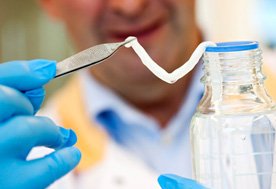Dec 22 2009
The cellulose produced by bacteria could be used for artificial blood vessels in the future as it carries a lower risk of blood clots than the synthetic materials currently used for bypass operations, reveals a thesis from the Sahlgrenska Academy at the University of Gothenburg, Sweden.
 artificial blood vessel
artificial blood vessel
Produced by a bacterium known as Acetobacter xylinum, the cellulose is strong enough to cope with blood pressure and works well with the body's own tissue. The thesis shows that the material also carries a lower risk of blood clots than the synthetic materials currently in use.
"There are hardly any blood clots at all with the bacterial cellulose, and the blood coagulates much more slowly than with the materials I used as a comparison," says molecular biologist Helen Fink, who wrote the thesis. "This means that the cellulose works very well in contact with the blood and is a very interesting alternative for artificial blood vessels."
Real blood vessels have an internal coating of cells that ensure that the blood does not clot. Helen Fink and her colleagues have modified the bacterial cellulose so that these cells adhere better.
"We've used a brand new method which allows us to increase the number of cells that grow in the bacterial cellulose without changing the material's structure," says Fink.
BYPASS OPERATIONS
If the coronary vessels around the heart are blocked as a result of hardening of the arteries, it may be necessary to carry out a bypass operation. Every year around 6,000 of these operations are carried out in Sweden. The surgeon takes a section of a vein from, for example, the patient's leg, and uses it to divert the blood around the hardened artery. Where patients do not have any suitable vessels, a vessel made of synthetic material is used instead.